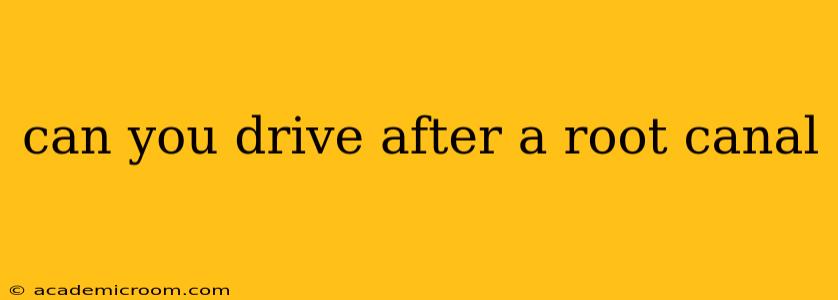Having a root canal is a common dental procedure, and many patients wonder about the impact it might have on their ability to drive afterward. The short answer is: usually, yes, you can drive after a root canal, but with some important caveats. The effects of the procedure, and your personal reaction to them, are key factors to consider.
What Happens During a Root Canal?
Before we address the driving question, let's quickly review what a root canal entails. During a root canal, the dentist removes the infected pulp (the soft tissue inside your tooth) from the root canals. This infected pulp can cause significant pain and infection if left untreated. The canals are then thoroughly cleaned, disinfected, and filled with a special material to seal them. The tooth is often then capped with a crown to protect it.
The procedure itself usually involves local anesthesia, which numbs the area being worked on. This is the most important factor in determining your ability to drive safely after your procedure.
Can You Drive Home After a Root Canal? What About Later That Day?
This is where things get a little more nuanced. While the procedure itself doesn't directly impede your driving ability, the anesthesia certainly does. Most dentists advise against driving immediately after a root canal, especially while the numbing effects of the local anesthetic are still present.
The reason for this is simple: driving requires alertness, coordination, and clear judgment. The anesthetic temporarily affects these abilities. You might misjudge distances, have trouble reacting quickly, or even experience temporary dizziness or lightheadedness.
Therefore, you should have a friend or family member drive you home. Arrange for a ride in advance to avoid any potential risks.
Once the anesthesia has fully worn off (typically several hours after the procedure), driving is usually fine. However, pain medication prescribed post-procedure could also affect your ability to drive. Always follow your dentist's instructions regarding medication and driving.
What if I Feel Pain After the Root Canal?
Post-root canal pain is manageable, usually subsiding within a few days. However, it's essential to communicate any significant discomfort to your dentist. If you experience severe pain or any other concerning symptoms after a root canal, consult your dentist immediately. Pain medication might affect your ability to drive safely.
Will Pain Medication Affect My Driving?
Many dentists prescribe pain relievers after a root canal. Some pain medications can cause drowsiness, dizziness, or impaired coordination—all detrimental to safe driving. Never drive while under the influence of any medication that could affect your driving ability. Always check the medication's instructions for warnings about driving.
How Long Should I Wait Before Driving After a Root Canal?
There's no magic number. It depends entirely on how long the anesthetic's effects last, and whether you've taken any pain medication that affects your driving ability. As a general rule of thumb, wait until the numbness is completely gone, and you feel fully alert and able to react normally before getting behind the wheel.
When Should I Call My Dentist After a Root Canal?
Contact your dentist immediately if you experience:
- Severe pain that doesn't improve with medication.
- Swelling or increased sensitivity in the treated area.
- Signs of infection, such as fever or pus.
- Any other unusual or concerning symptoms.
In conclusion, while it's possible to drive after a root canal, it's not recommended until you're fully alert and the effects of anesthesia and any pain medication have worn off. Prioritize your safety and the safety of others by arranging for alternative transportation home. Always follow your dentist's instructions carefully.
